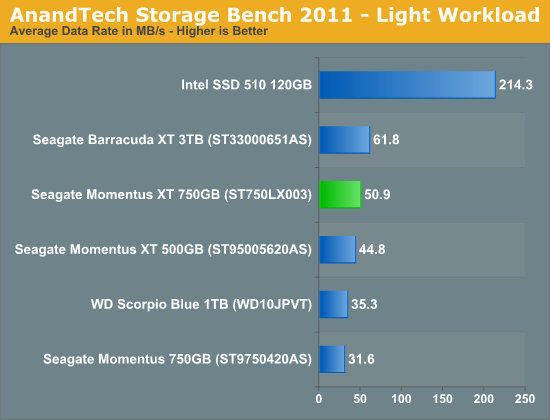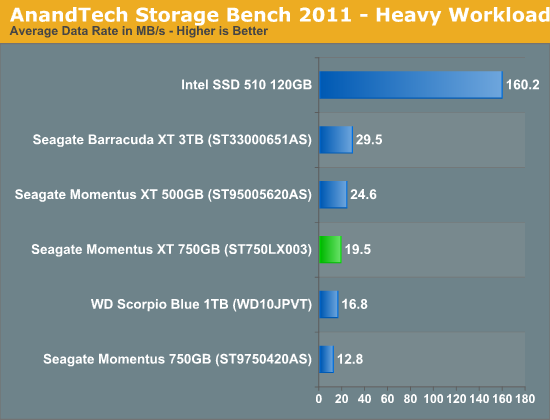Seagate 2nd Generation Momentus XT (750GB) Hybrid HDD Review
by Anand Lal Shimpi on December 13, 2011 12:51 AM EST- Posted in
- Storage
- Seagate
- Momentus XT
- Hybrid Drive
- HDDs
- SSHDs
AnandTech Storage Bench 2011
Admittedly most of the benchmarks on the previous page really portray the Momentus XT in the best light possible. The workloads are light enough to mate well with the 8GB cache and none of them are really write intensive. Over time however you'll encounter more varied workloads, including those that are write intensive or those that only access data once or twice. In workloads that aren't perfectly tailored to the Momentus XT's cache, the honeymoon is over before it began. We'll start with our light storage bench:

Here overall performance is definitely higher than any of the 2.5" drive offerings, including last year's 500GB Momentus XT. However compared to the 3.5" Barracuda XT, the newer Momentus XT is tangibly slower over the course of our test. If you look at performance compared to the Intel SSD 510, there's simply no competition.
Our trace based Storage Bench suites were designed to really stress SSDs, thus being more write intensive than your typical client workload. Not being able to cache writes at this point, the Momentus XT is penalized (perhaps unfairly) in these benchmarks. The results are valid however - when it comes to writing or non-repetitive workloads, the Momentus XT will perform like a good 2.5" hard drive rather than in the realm of SSD performance.
Our Heavy Storage Bench workload is even more write intensive. Furthermore, having been recorded on a Windows 7 pre-SP1 install, we see some of the potential penalties from moving to a 4KB sector drive. Most writes are 4KB aligned in Windows 7, however pre-SP1 there were still some significant cases where alignment could be an issue. Here we see the 750GB/4KB Momentus XT actually fall behind the 500GB drive with 512B sectors because of this difference:

I included these results because if you formatted your drive with Windows 7 and later applied SP1 to the install, you may see this sort of performance regression when moving to a 4KB sector drive. The only way to avoid this is to reformat your drive using Windows 7 SP1 and install from a Windows 7 SP1 DVD/image. In place upgrades won't avoid the alignment issues that are exhibited here. For a greater understanding of why 4KB sectors are necessary and why alignment can be problematic on these drives, have a look at our coverage here.










98 Comments
View All Comments
JimmiG - Thursday, December 15, 2011 - link
Will you be doing a review of the 64GB and 128GB OCZ Synapse Cache SSD drives for comparison?They are a bit more complex to manage and require a separate driver and software to be installed, but they also cache writes and can be added as a cache to any mechanical drive of your choice.
Gidde - Thursday, December 15, 2011 - link
Do RAID problems related to SSDs also apply to Hybrid HDDs ? Has anyone tested running the 1st gen Momentus XT in RAID 0/1 ? Ive read a few places that the drives break quickly when in RAID...7Enigma - Thursday, December 15, 2011 - link
"To gain widespread adoption Seagate needs two things: 1) aggressive pricing and 2) a second supplier of hybrid HDDs."Number 3 (but should really be #1) is reliability and the original Momentus XT had HORRIBLE reliability. Honestly it was much worse than Sandforce's Vertex issues and yet got little to no press.
Take a look at Seagate's own forum, and reviews on Newegg/Amazon. The failure rates are unknown (at least to me), but the amount of firmware updates and dead drives are not insignificant.
After your first glowing review I was in line to purchase one myself, and recommend in all my builds that couldn't swallow the high cost of SSD's at the time. I'm glad I never bought one....
Daniel Egger - Friday, December 16, 2011 - link
it sucks more power (thus emitting more heat) than the older version which is already problematic in my 2007 MacBook Pro, is barely faster than the older version but considerably more expensive? What on earth makes this drive a winner?And then there's still the open question whether they have finally overcome the design problems of generation one where performance may stutter/freeze, the quite disturbing clicking and chirping, the absent proper power management and the nasty vibration...
Luckily my XT works okay-ish for me (though I had much higher expectation) but clicking, vibration and decreased battery life make me wary about the new generation. I'll probably not do it again...
Hrel - Saturday, December 17, 2011 - link
I really hope Western Digital has a 16-24GB hybrid 2.5" drive in the works. A second player in the market, as you said, would help out a lot. And as far as reliability I've always had better luck with WD that Seagate. Also that amound on on board NAND would actually be usefull, where 4-8 is just barely enough and certainly less than ideal.shady28 - Sunday, December 18, 2011 - link
I'd really like to see a comparison of these HDDs short stroked to some multiple of the capacity of the SSDs. These days you can get 1000 gig hdd's for ~ $70, so if you short stroked it to 256 gig how would it compare to a 128 gig SSD? Theoretically that should lower the average seek time by 75%, which would significantly improve its random read/write performance.
darrengadget - Wednesday, December 21, 2011 - link
Sorry to say it, but its a question I have to ask some of the people posting prior to this.This is an elegant solution to the problem of size vs speed vs price that will continue until SSD prices fall considerably.
It may not be for you, and thats understandable, but I'm pretty sure it fits the bill for crap loads of others, people like me!
Not every computer user has a custom desktop pc with room for multiple drives, with tonnes of spare time to throw into managing and installing potentially complicated data systems.
Lets ask a few things to understand the market,
What is the largest selling computer product in the world?
the laptop (over 60% of new consumer computer products last year were laptops)
Therefore, what is the biggest install base for manufacturers/OEM purchasers of consumer hdd's?
the laptop
Why do people buy laptops?
Portability, compact size, and style
What would most people like to improve with their laptops?
Performance
What is one of the biggest single factors affecting today's laptop operation speeds?
The hard disk
Why not go totally SSD then?
People don't all have gold bars stashed, or shotguns to rob banks (unless you're american of course) ;-)
But seriously, most people with any stored media (music/video) that are using their laptop as their primary computer need 500gb or larger. So you'll be blowing £800 ($1400 ish) or a lot more.
So from those questions we ascertained that most computer users basically, need a large capacity, that gets close to the speeds of SSD's, that fits into a 2.5mm form factor, that doesn't require an external box to lug around or lose. Oh, and it can't cost crazy money!
If only there was a product that did all this.........
wintermute000 - Tuesday, January 3, 2012 - link
Happy owner of 1st gen Momentus XT here.Would have upgraded if the price wasn't so horrible, really could do with >750Gb space. However as my laptop is a tertiary PC (desktop, media centre at home + tablet... yeah total tech junkie) can't really justify the massive price hike for a bit more holiday/travel convenience.
To those who say it makes no difference compared to a conventional notebook drive, you must be terribly unlucky with your usage pattern / hardware combo / specific dud unit?, or really unobservant.
I also do the standard SSD + massive amounts of conventional storage solution on my desktop and yeah its nowhere near SSD speeds but for laptops with only 1 drive, its the only game in town (unless you either want to drop the price of an entire laptop on a 512G SSD or live with sweet FA storage).
wintermute000 - Tuesday, January 3, 2012 - link
and oh I had a lenovo with a 32Gb Rapiddrive solution that was similar except it was a PCIE flash drive that the BIOS/firmware on the mobo hid from the system. It was bloody lightning with the OS once it cached everything.If/when they do a 32Gb cache I'm on it like a rash, its pretty much indistinguishable from a full blown SSD for anything cached - and if its 32Gb basically the entire OS and all your apps are cached.
hgurol - Tuesday, February 14, 2012 - link
Can anyone comment on Virtual Machine performance of this drive please?I already have an 7200 rpm hdd on my laptop and Im happy with its performance. I heavily use virtual machines and if this drive is significantly increasing the Virtual Machine performance, then I would not mind an upgrade.
Thanks...